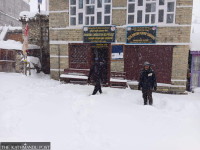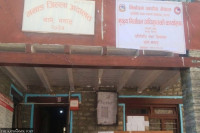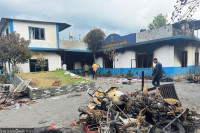Gandaki Province
Courts hire lawyers to work pro bono, but litigants don’t know they’re there
The law says senior citizens, the poor and disabled, can hire court-sponsored lawyers for free, but they often hire attorneys they cannot afford.-by-Aash-Gurung.jpg&w=900&height=601)
Lal Prasad Sharma
Even if someone knows about the court-sponsored lawyers, getting the attorneys to work is a challenge for various reasons.
Members of the general public the Post spoke to outside the district courts in Lamjung, Myagdi, Baglung and Kaski were unaware that senior citizens, the poor and the disabled can hire a lawyer for free.
Article 20 of the Constitution of Nepal says that any indigent party shall have the right to free legal aid in accordance with law. The Legal Aid Act (1997) and Legal Aid Rules (1998) say that the district legal aid committee, based on the recommendation of local governments, may grant legal aid to a particular person.
“I learnt about the provision only a couple of days ago. I almost had to hire a private lawyer, something I can’t afford to do,” said a middle-aged woman of Purankot in Lamjung district. “I went to the court to understand the proceedings. That’s when I learnt about the service,” said the woman, who didn’t wish to be identified. “I visited my municipality to get a recommendation letter. I’m now looking for a lawyer to handle my case for free,” she said.
The lawyer the woman plans to hire and others sponsored by the court enjoys pay and perks similar to that of a section officer, said Krishna Prasad Adhikari, chairman of Nepal Bar Association’s Lamjung unit. “The court-sponsored lawyer is appointed to argue on behalf of the poor and needy people and help in other legal processes,” he added. As per the law, the district court can appoint any registered advocate to work pro bono.
At the Baglung District Court, Chhabilal Pun, a litigant the Post met, hired a lawyer he could not afford by taking a loan. “I took a loan to hire a private lawyer. Only when the proceedings began at the court did I learn that there’s free legal aid available,” added Pun.
In Kaski, the lawyer appointed by the district court to provide legal aid to litigants of the targeted groups, handles four-five cases per day. Advocate Bishnu Adhikari, the court’s pro bono lawyer, says, “People are receiving free legal aid. But all the litigants of the targeted group do not know about the service,” said Adhikari.
“We have been providing services to the litigants based outside the district facing lawsuits in the district court. They are not necessarily poor,” said Sudarshan Kumar Shrestha, the court-appointed lawyer in Myagdi.
Advocate Hari Bahadur Ranabhat has been working as a court-appointed lawyer for the past year at the Lamjung District Court. He said he has already represented clients in 21 cases and is working on 15 others including those related to drug trafficking, homicide, defamation, and theft on behalf of poor clients.
“I am mostly available at the court. I often ask visitors at the court whether they need free legal aid,” said Ranabhat. He, however, says most people who need aid do not know about the provision.
The attorney appointed by the Myagdi district court has a story different from that of Ranabhat. “Not a single case has seen a court-sponsored lawyer argue for a client at the court this fiscal,” said Ambika Sharma, an officer at the Myagdi District Court. “We have seen that around 20 percent of the criminal cases and 10 percent of the civil cases registered in the court normally have members of the target group as litigants,” said Khil Prasad Burlakoti, the registrar at the court.
The figures suggest that the lawyers may not be fulfilling their duties, added Burlakoti. He says that for pro bono lawyers to work effectively, the way they are appointed needs to be reviewed. “The provision allows the district court judge to appoint a court-sponsored lawyer. But in reality, the district bar sends lawyers to fill the post,” said Khil Prasad Burlakoti, the registrar at the court, and they might not be suited for the job.
(Aash Gurung in Lamjung, Ghanshyam Khadka in Myagdi and Prakash Baral in Baglung contributed reporting)




 9.83°C Kathmandu
9.83°C Kathmandu.jpg)











